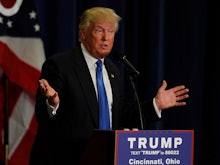How the Dallas Police Shooting Could Trigger a Pro-Donald Trump Backlash

Donald Trump steered clear of his characteristic bombast in responding to the massacre of five police officers patrolling a Black Lives Matter protest in Dallas on Thursday night, ditching the self-congratulations he put forth after last month's attack on Orlando's Pulse nightclub in favor of a somber statement lamenting national division and racial tension.
But while the presumptive Republican presidential nominee sought to avoid the appearance of nakedly capitalizing on the latest tragedy to boost his White House hopes, an upsurge in law-and-order sentiment may yet deliver him the presidency.
An eerie echo: To some observers, the potential fallout from the Dallas sniper attack — which was not carried out by demonstrators themselves, but apparently by a rogue suspect who expressed a desire to kill whites — evokes the political dynamics of a similarly turbulent period in American history.
Trump's likely Nov. 8 face-off against presumptive Democratic nominee Hillary Clinton will come 50 years to the day after Republicans — aided by what analysts dubbed a "white backlash" against civil rights demonstrators — posted massive gains in the 1966 midterm elections, picking up 47 House seats, three Senate seats and eight governorships.
Coming just two years after Democratic President Lyndon B. Johnson crushed his right-wing Republican opponent, Barry Goldwater, the results laid waste to the conventional wisdom that the nation was on track for a long liberal epoch, defined by the expansion of civil rights and social programs at home and a muscular foreign policy abroad.
Jolted by events like the 1965 Watts Riots in Los Angeles — which stemmed from the police stopping of an African-American motorist, and caused more than $40 million in property damage — white Americans came to see urban unrest as evidence of the excesses of the civil rights movement.
In October 1966, 59% of whites living in large cities told the Harris Survey that racial tensions left them feeling personally unsafe on the streets, while 85% of whites overall said they felt that continued civil rights demonstrations hurt the black cause. Richard Nixon seized on such sentiment in his 1968 presidential campaign, winning the White House on a pledge to restore "law and order."
A new backlash? While leaders of the Black Lives Matter movement have forcefully condemned the Dallas attack, it's far from implausible that the attack will similarly foster growing skepticism of the movement as a whole — and increase the appeal of Trump's law-and-order message.
"It does have the potential to broaden his support. This is the kind of theme he has talked about," Princeton University historian Julian Zelizer told Mic. "Whether he's talking about immigration or policing, he always has this big message of reestablishing law and order."
The electorate is already divided over the demands of the Black Lives Matter movement, with one November 2015 poll finding that 44% of Americans believed blacks already received equal treatment from the criminal justice system, against 41% who said they encountered discrimination. And according to a June poll from Gallup, the police continue to enjoy the confidence of a majority of the public, with 56% of Americans expressing either a "great deal" or "quite a lot" of confidence in them. Pro-police sentiment may spike further after Thursday's attack — and Trump will be eager to tap into it.
Trump has racked up endorsements from law enforcement officers, and declared at a January debate that police are the "most mistreated people in this country."
Even more than immigration, Zelizer said, fears of unrest may carry an "emotional resonance" for many disaffected white voters — some of them older, once Democrats residing in the Rust Belt states Trump has targeted for victory.
Zelizer added that mounting anxieties about race relations could also help Trump win over Republicans who have yet to embrace his candidacy.
"This could certainly solidify his support. There are many Republicans who even in this more diverse era on issues of policing and institutional racism, they're not always sympathetic to what we've heard from Black Lives Matter," he said.
Abandoning the tough-on-crime line she espoused in the 1990s, Clinton has embraced many of the criminal justice reforms championed by Black Lives Matter — a potential point of attack for Trump.
A different ending? Still, Trump will face the most diverse electorate in U.S. history this fall, with the Pew Research Center projecting that 31% of voters will be racial or ethnic minorities.
That's a far less white electorate than the one that sent Nixon to the White House in 1968, and it underscores that white anxiety alone won't be enough to elect Trump — particularly if his poor standing with minority voters causes him to lose crucial states like Florida and North Carolina. A less-than-measured response to events like Dallas could also badly damage Trump's effort to make inroads with non-white voters.
But with polls showing that Clinton leads Trump by an average of less than five percentage points nationally, the race is not shaping up to be the blowout that many Democrats have hoped for — and many Republicans have feared.
For now, the ramifications of the carnage in Dallas remain to be determined — but a tumultuous past doesn't truly seem past at all.
"Because of social media and telephones, there's more understanding of the problems with policing," Zelizer told Mic. "But 50-plus years later, I don't think all those tensions that were so evident in 1967 and '68 have disappeared."
Read more: